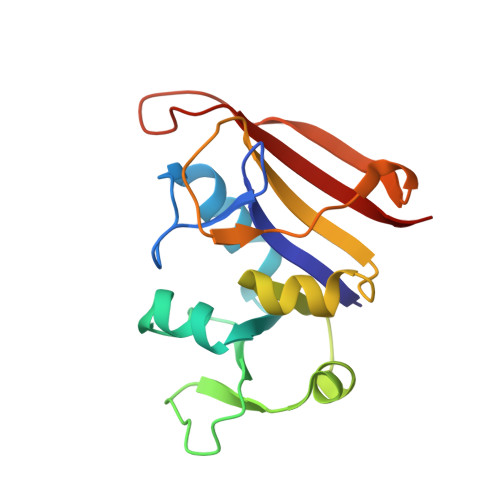Nonracemic Antifolates Stereoselectively Recruit Alternate Cofactors and Overcome Resistance in S. aureus.
Keshipeddy, S., Reeve, S.M., Anderson, A.C., Wright, D.L.(2015) J Am Chem Soc 137: 8983-8990
- PubMed: 26098608
- DOI: https://doi.org/10.1021/jacs.5b01442
- Primary Citation of Related Structures:
4TU5, 4XEC - PubMed Abstract:
While antifolates such as Bactrim (trimethoprim-sulfamethoxazole; TMP-SMX) continue to play an important role in treating community-acquired methicillin-resistant Staphylococcus aureus (CA-MRSA), resistance-conferring mutations, specifically F98Y of dihydrofolate reductase (DHFR), have arisen and compromise continued use. In an attempt to extend the lifetime of this important class, we have developed a class of propargyl-linked antifolates (PLAs) that exhibit potent inhibition of the enzyme and bacterial strains. Probing the role of the configuration at the single propargylic stereocenter in these inhibitors required us to develop a new approach to nonracemic 3-aryl-1-butyne building blocks by the pairwise use of asymmetric conjugate addition and aldehyde dehydration protocols. Using this new route, a series of nonracemic PLA inhibitors was prepared and shown to possess potent enzyme inhibition (IC50 values <50 nM), antibacterial effects (several with MIC values <1 μg/mL) and to form stable ternary complexes with both wild-type and resistant mutants. Unexpectedly, crystal structures of a pair of individual enantiomers in the wild-type DHFR revealed that the single change in configuration of the stereocenter drove the selection of an alternative NADPH cofactor, with the minor α-anomer appearing with R-27. Remarkably, this cofactor switching becomes much more prevalent when the F98Y mutation is present. The observation of cofactor site plasticity leads to a postulate for the structural basis of TMP resistance in DHFR and also suggests design strategies that can be used to target these resistant enzymes.
Organizational Affiliation:
Department of Pharmaceutical Sciences, University of Connecticut, 69 North Eagleville Road, Storrs, Connecticut 06269, United States.

















